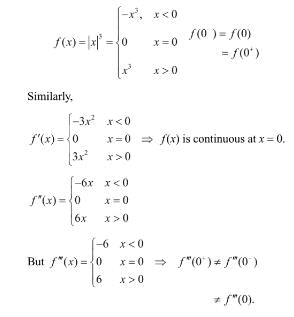Mechanical Engineering Exam > Mechanical Engineering Tests > GATE Mechanical (ME) Mock Test Series 2025 > Test: Theorems of Integral Calculus- 1 - Mechanical Engineering MCQ
Test: Theorems of Integral Calculus- 1 - Mechanical Engineering MCQ
Test Description
20 Questions MCQ Test GATE Mechanical (ME) Mock Test Series 2025 - Test: Theorems of Integral Calculus- 1
Test: Theorems of Integral Calculus- 1 for Mechanical Engineering 2025 is part of GATE Mechanical (ME) Mock Test Series 2025 preparation. The Test: Theorems of Integral Calculus- 1 questions and answers have been
prepared according to the Mechanical Engineering exam syllabus.The Test: Theorems of Integral Calculus- 1 MCQs are made for Mechanical Engineering 2025 Exam. Find important
definitions, questions, notes, meanings, examples, exercises, MCQs and online tests for Test: Theorems of Integral Calculus- 1 below.
Solutions of Test: Theorems of Integral Calculus- 1 questions in English are available as part of our GATE Mechanical (ME) Mock Test Series 2025 for Mechanical Engineering & Test: Theorems of Integral Calculus- 1 solutions in
Hindi for GATE Mechanical (ME) Mock Test Series 2025 course. Download more important topics, notes, lectures and mock
test series for Mechanical Engineering Exam by signing up for free. Attempt Test: Theorems of Integral Calculus- 1 | 20 questions in 60 minutes | Mock test for Mechanical Engineering preparation | Free important questions MCQ to study GATE Mechanical (ME) Mock Test Series 2025 for Mechanical Engineering Exam | Download free PDF with solutions
Test: Theorems of Integral Calculus- 1 - Question 1
As x is increased from – ∞ to ∞ , the function

Detailed Solution for Test: Theorems of Integral Calculus- 1 - Question 1
Detailed Solution for Test: Theorems of Integral Calculus- 1 - Question 2
Detailed Solution for Test: Theorems of Integral Calculus- 1 - Question 3
Detailed Solution for Test: Theorems of Integral Calculus- 1 - Question 4
Detailed Solution for Test: Theorems of Integral Calculus- 1 - Question 5
Detailed Solution for Test: Theorems of Integral Calculus- 1 - Question 6
Test: Theorems of Integral Calculus- 1 - Question 7
Which of the following functions is not differentiable in the domain [-1,1]?
Detailed Solution for Test: Theorems of Integral Calculus- 1 - Question 7
Detailed Solution for Test: Theorems of Integral Calculus- 1 - Question 8
Detailed Solution for Test: Theorems of Integral Calculus- 1 - Question 9
Test: Theorems of Integral Calculus- 1 - Question 10
What should be the value of λ such that the function defined below is continuous at x = π/2?
Detailed Solution for Test: Theorems of Integral Calculus- 1 - Question 10
Detailed Solution for Test: Theorems of Integral Calculus- 1 - Question 11
Test: Theorems of Integral Calculus- 1 - Question 12
Consider the function f(x) = |x|3, where x is real. Then the function f(x) at x = 0 is
Detailed Solution for Test: Theorems of Integral Calculus- 1 - Question 12
Test: Theorems of Integral Calculus- 1 - Question 13
The expression e–ln x for x > 0 is equal to
Detailed Solution for Test: Theorems of Integral Calculus- 1 - Question 13
Test: Theorems of Integral Calculus- 1 - Question 14
Consider the following two statements about the function f(x) = |x|
P: f(x) is continuous for all real values of x
Q: f(x) is differentiable for all real values of x
Which of the f oll owi ng is TRU E?
Detailed Solution for Test: Theorems of Integral Calculus- 1 - Question 14
Detailed Solution for Test: Theorems of Integral Calculus- 1 - Question 15
Detailed Solution for Test: Theorems of Integral Calculus- 1 - Question 16
Test: Theorems of Integral Calculus- 1 - Question 17
Which one of the following function is strictly bounded?
Detailed Solution for Test: Theorems of Integral Calculus- 1 - Question 17
Detailed Solution for Test: Theorems of Integral Calculus- 1 - Question 18
Test: Theorems of Integral Calculus- 1 - Question 19
Which of the following integrals is unbounded?
Detailed Solution for Test: Theorems of Integral Calculus- 1 - Question 19
Test: Theorems of Integral Calculus- 1 - Question 20
What is the value of the definite integral,
Detailed Solution for Test: Theorems of Integral Calculus- 1 - Question 20
|
29 docs|220 tests
|
Information about Test: Theorems of Integral Calculus- 1 Page
In this test you can find the Exam questions for Test: Theorems of Integral Calculus- 1 solved & explained in the simplest way possible.
Besides giving Questions and answers for Test: Theorems of Integral Calculus- 1, EduRev gives you an ample number of Online tests for practice




















